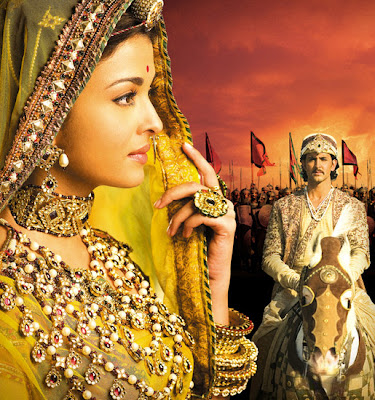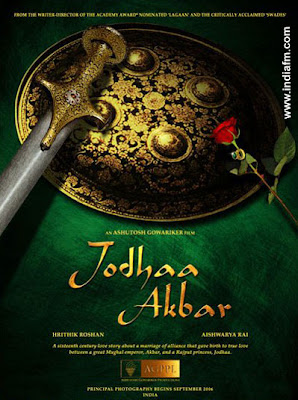It’s been a long time since I have walked out of the cinema hall with a feeling of equanimity and the asseveration of having just witnessed a film that will go down in history as a classic. The last time I was overcome by such a feeling was with Sanjay Leela Bhansali’s poetic Saawariya, a film that many people rejected for its folklore style.
Jodhaa Akbar rekindled my faith in why Hindi cinema is the greatest entertainer in the glimmering world of movie lights, for it could only be the Hindi film industry that could conceive such a monopolizing oeuvre.
Set in the 16th century, Jodha Akbar is a sumptuous saga of romance which blossoms under the schismatic setting of political astriction during the Mughal era.

Rajput King Bharmal of Amer (Khulbhushan Khabarnda) arranges a marriage of alliance between his daughter Jodhaa (Aishwarya Rai) and the Mughal Emperor Jalaudin Akbar (Hrithik Roshan) thus sewing the seed of tranquility between both communities.
However, Akbar is unaware that Jodha resents the consanguinity in which she has been used as seal against the polemics of politics, presenting him with a battle far greater than those he has enacted on the warfield…to conquer the love of his queen.
Armed with his heart as his weapon, Akbar’s language of love is as confident as each swing of his sword and by the time he has managed to encapsulate Jodhaa, the soil of the Mughal dynasty is marred yet again with the threat of annexation in which Akbar’s love for his kingdom becomes parallel to the love of his Jodhaa.
Asutosh Gowariker has to be congratulated for making a film with such conviction and executing his story on such a grand platform. Whilst the general consensus of many is that historical films dabble more in the complexities of the past through stolid like factual presentation, Gowariker is able to use his finesse of mixing drama with authenticity – the result being an exhilarating lesson in history which also carries a strong heart. The nail biting battle scenes have all been captured with sharp camera movements, transporting the viewer to the battlefield, the tense palaver between Ila Arun and Aishwarya demanded pin drop silence from everyone in the cinema hall…exemplary of the maestro director’s ability to capture the audience and throw them into a bygone era.

Hrithik Roshan as the Great Emperor Akbar is awe-inspiring. His performance is of dizzying heights, meticulously delivered without any room for criticism. Roshan epitomizes perfection, both physically and creatively resulting in the finest screen presence to be witnessed since Amitabh Bachchan. His Akbar is powerful and unflinching yet in a split second can transform to a smirking lover of loyalty towards his queen presenting a humane depiction of a figure who was obviously more than just a temerarious ruler. Roshan proves yet again just why he is the finest male lead to grace the screen since the millennium.
Aishwarya Rai is always at her best when she is regal and in Jodhaa Akbar she is dignity personified. The character of Jodhaa demanded a fiery yet graceful streak of personality and Rai achieves this balance with uttermost ease. The scene where she exchanges heated words with Akbar upon his accusation of her deceit is tremendous as she conveys vulnerability with angst, using her eyes to emote a thousand words. A character that does not demand huge amounts of dialogues but more so relies on the ability for Rai to emote with her expressions resulting in a play of wholehearted curtailment. Jodhaa Akbar is sure to go down as one of Rai’s finest examples of talent.
A R Rahman’s music may not be of chartbusting quality but it moulds itself into the story in such a way that without becoming officious to the narrative, it still acts as a conclusive transition, especially the Sufi style “Khwaja Mere Khwaja” which oozes a spiritualistic aroma of melody. “Azeem O Shah Shahensha” is robust in its presentation and only electrifies the magnitude of the character that Akbar was.

One can not speak about Jodhaa Akbar without mentioning the cinematography and costumes. There is a danger that when films are seeped in such grandeur, they shimmer more for their ability to satisfy the visual palette rather than offer satiating content but Jodhaa Akbar does not suffer from this ailment. The need for the ostentatious presentation is fully justified and equally rewarding to the eye, be it the intricate halls of the palace or the deliciously crafted jewels, all have their place and thankfully due to a taut screenplay, do not serve as mere ornaments by which viewers can pass their time admiring their beauty. Rather, one spends the duration of the film engulfed in the proceedings of the story which are only taken to a higher level with the alluring ambience of the Mughal era.
Period dramas carry with them the promise of acting as tools for society, where in today’s times many people are recalcitrant to pick up a book and read history; cinema offers them the opportunity of visually engaging with the quondam and interpreting facts in a more appealing manner. Jodhaa Akbar allows its audience all of this in a manner which is simplistic in relaying chronologic events yet also embarks on a simultaneous journey of love and acceptance, mixing the two to create an evocative experience.
History with a heart, Jodhaa Akbar ravages the screen with its royal fest of nobility and catalytic performances , crowning it’s viewers with cinematic glory.
Jodhaa Akbar rekindled my faith in why Hindi cinema is the greatest entertainer in the glimmering world of movie lights, for it could only be the Hindi film industry that could conceive such a monopolizing oeuvre.
Set in the 16th century, Jodha Akbar is a sumptuous saga of romance which blossoms under the schismatic setting of political astriction during the Mughal era.

Rajput King Bharmal of Amer (Khulbhushan Khabarnda) arranges a marriage of alliance between his daughter Jodhaa (Aishwarya Rai) and the Mughal Emperor Jalaudin Akbar (Hrithik Roshan) thus sewing the seed of tranquility between both communities.
However, Akbar is unaware that Jodha resents the consanguinity in which she has been used as seal against the polemics of politics, presenting him with a battle far greater than those he has enacted on the warfield…to conquer the love of his queen.
Armed with his heart as his weapon, Akbar’s language of love is as confident as each swing of his sword and by the time he has managed to encapsulate Jodhaa, the soil of the Mughal dynasty is marred yet again with the threat of annexation in which Akbar’s love for his kingdom becomes parallel to the love of his Jodhaa.
Asutosh Gowariker has to be congratulated for making a film with such conviction and executing his story on such a grand platform. Whilst the general consensus of many is that historical films dabble more in the complexities of the past through stolid like factual presentation, Gowariker is able to use his finesse of mixing drama with authenticity – the result being an exhilarating lesson in history which also carries a strong heart. The nail biting battle scenes have all been captured with sharp camera movements, transporting the viewer to the battlefield, the tense palaver between Ila Arun and Aishwarya demanded pin drop silence from everyone in the cinema hall…exemplary of the maestro director’s ability to capture the audience and throw them into a bygone era.

Hrithik Roshan as the Great Emperor Akbar is awe-inspiring. His performance is of dizzying heights, meticulously delivered without any room for criticism. Roshan epitomizes perfection, both physically and creatively resulting in the finest screen presence to be witnessed since Amitabh Bachchan. His Akbar is powerful and unflinching yet in a split second can transform to a smirking lover of loyalty towards his queen presenting a humane depiction of a figure who was obviously more than just a temerarious ruler. Roshan proves yet again just why he is the finest male lead to grace the screen since the millennium.
Aishwarya Rai is always at her best when she is regal and in Jodhaa Akbar she is dignity personified. The character of Jodhaa demanded a fiery yet graceful streak of personality and Rai achieves this balance with uttermost ease. The scene where she exchanges heated words with Akbar upon his accusation of her deceit is tremendous as she conveys vulnerability with angst, using her eyes to emote a thousand words. A character that does not demand huge amounts of dialogues but more so relies on the ability for Rai to emote with her expressions resulting in a play of wholehearted curtailment. Jodhaa Akbar is sure to go down as one of Rai’s finest examples of talent.
A R Rahman’s music may not be of chartbusting quality but it moulds itself into the story in such a way that without becoming officious to the narrative, it still acts as a conclusive transition, especially the Sufi style “Khwaja Mere Khwaja” which oozes a spiritualistic aroma of melody. “Azeem O Shah Shahensha” is robust in its presentation and only electrifies the magnitude of the character that Akbar was.

One can not speak about Jodhaa Akbar without mentioning the cinematography and costumes. There is a danger that when films are seeped in such grandeur, they shimmer more for their ability to satisfy the visual palette rather than offer satiating content but Jodhaa Akbar does not suffer from this ailment. The need for the ostentatious presentation is fully justified and equally rewarding to the eye, be it the intricate halls of the palace or the deliciously crafted jewels, all have their place and thankfully due to a taut screenplay, do not serve as mere ornaments by which viewers can pass their time admiring their beauty. Rather, one spends the duration of the film engulfed in the proceedings of the story which are only taken to a higher level with the alluring ambience of the Mughal era.
Period dramas carry with them the promise of acting as tools for society, where in today’s times many people are recalcitrant to pick up a book and read history; cinema offers them the opportunity of visually engaging with the quondam and interpreting facts in a more appealing manner. Jodhaa Akbar allows its audience all of this in a manner which is simplistic in relaying chronologic events yet also embarks on a simultaneous journey of love and acceptance, mixing the two to create an evocative experience.
History with a heart, Jodhaa Akbar ravages the screen with its royal fest of nobility and catalytic performances , crowning it’s viewers with cinematic glory.
